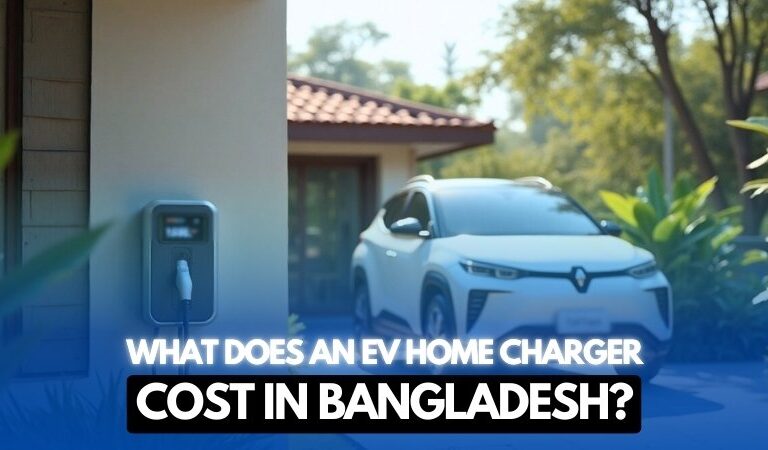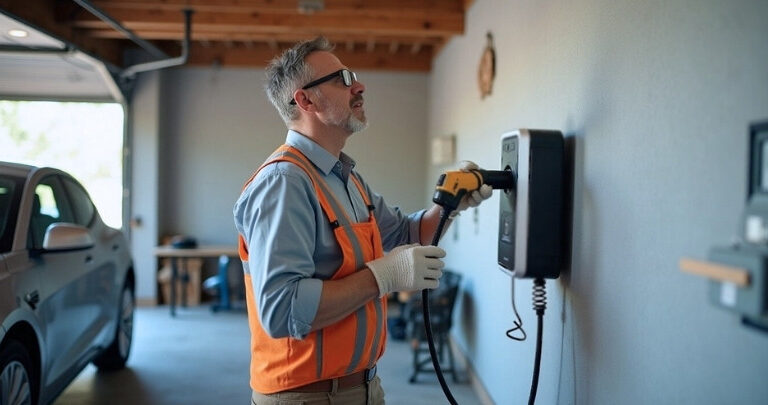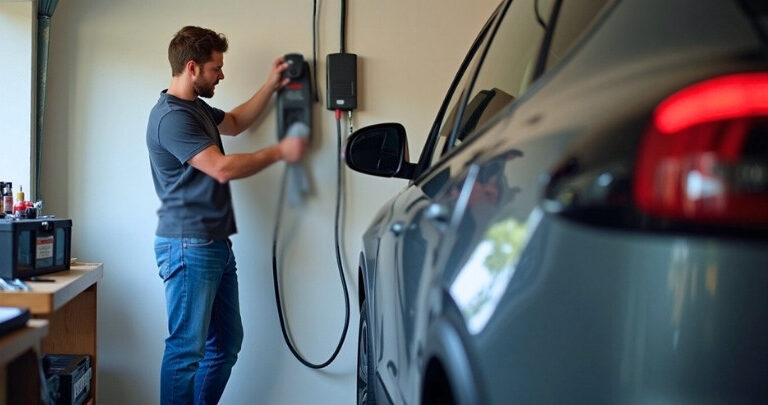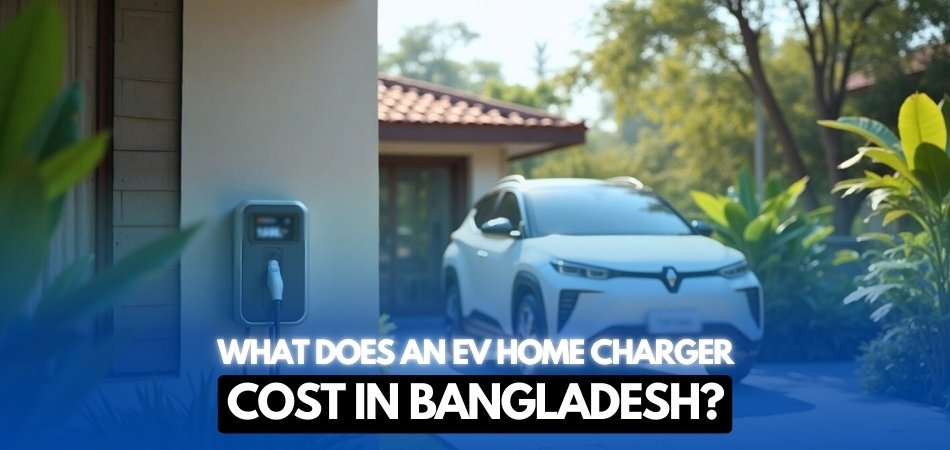In Bangladesh, electric cars are becoming more popular, and many people want to charge their cars at home. A home EV charger lets you charge your car easily, without going to a station. But many people often ask—what does an EV home charger cost in Bangladesh?
The price usually ranges from Tk 55,000 to over Tk 145,000. This depends on the type of charger and the features it has. You may also need to pay extra for wiring, setup, and installation. If you use electricity from the grid, your bill may go up. On the other hand, solar chargers cost more at first and can save money later.
Want to know more regarding the cost? Keep reading!
What Does an EV Home Charger Cost in Bangladesh? (Key Factors)
A home EV charger in Bangladesh costs from Tk 55,000 to over Tk 145,000. The total price depends on several things like the charger type, setup, and extra work. You might also need to pay for wiring, tools, or solar panels if used. Using solar can save money later, though it costs more at first. You’ll also pay for electricity every time you charge your car at home.

Type of Charger
There are different kinds of EV chargers with different power levels. Fast chargers cost more but charge your car in less time. Simple chargers are cheaper and work fine for daily use.
Advanced chargers come with more features and better quality. Some models support smart charging and app control for easy tracking. These features make life easier but raise the total price.
Power Output Level
Chargers that give more power will cost more money. High-output chargers need strong wiring and better setup support at home. They also charge your car much faster than low-level models.
Low-level chargers take more time but use less power from the grid. These chargers work well for short drives and local trips. You can pick one based on your daily driving needs.
Installation Costs
Professional setup needs extra money based on your house layout. If the wiring is far from your car, costs will rise. Local technicians might charge less, but quality can vary.
Setup tools and safety checks are also part of the total bill. Many people forget to include this while planning the budget. Getting a good installer ensures safety and long-term use.
Electrical Wiring and Safety
Older homes may need better wires or extra safety tools. New wiring costs more, but it’s needed for strong chargers. A safe system keeps your car and house secure.
Without proper wiring, the charger may not work well. Short circuits and overheating can happen if wiring is weak. Make sure your electric system can handle the charger load.
Charger Features and Smart Functions
Some chargers have Wi-Fi, timers, or mobile apps to check usage. These smart tools help save time and manage charging better. You’ll pay more if you want these extra features.
Cheaper models do not include smart systems or display screens. If you’re okay with basic use, simple chargers work well. Decide if features are worth the extra money.
Solar vs. Grid Charging
Solar panels can power your charger, but they cost a lot to install. This option saves you money over the years. It also helps the environment by using clean energy.
Grid charging is easier and cheaper to start with. However, your electricity bill will go up with daily use. People in sunny areas benefit more from solar power setups.
EV Charging Stations and Setup Choice
You may also think about using EV charging stations in Bangladesh instead of installing one at home. These stations are growing in many cities. Still, home chargers are more flexible and useful long-term.
Charging at public places may take longer or be full during busy hours. Home charging gives you comfort without long waits. The final choice depends on your lifestyle and daily travel needs.
Are There Any Financing Options Available for Purchasing an EV Home Charger in Bangladesh?
Yes, financing options are available for purchasing an EV home charger in Bangladesh. While specific programs for individual consumers are limited, some companies offer financing solutions for businesses and commercial entities. For instance, Kempower provides 0% interest rate financing for their DC fast-charging solutions, allowing businesses to expand their EV charging infrastructure without upfront costs. Additionally, Lincoln Electric offers competitive financing options for their Velion EV chargers through a partnership with Regents Capital Corporation.
In Bangladesh, companies like Crack Platoon Charging Solution Limited are leading the way in establishing EV charging stations across the country, including in cities like Comilla. While their focus is primarily on public charging stations, the expansion of such infrastructure indicates a growing market for EV-related services. As the demand for electric vehicles increases, it’s anticipated that more financing options tailored to individual consumers will emerge. For now, interested buyers should consult with local EV charger providers to explore any available financing plans.
Is There any Hidden Cost of Installing an EV Charger at Home?
Yes, there can be hidden costs when installing an EV charger at home. While the charger price is often clear, other charges might not be. These hidden costs depend on your home’s electric system, setup location, and required accessories. Many people miss these extra parts when planning their home charging station.

Electrical System Upgrades
Old homes often need better wires or stronger power systems before charger setup. Weak systems cannot support high-powered EV chargers safely. Electricians may need to change the main panel or fuse box. These changes increase the total setup price unexpectedly.
Wiring and Cable Length
If your charger location is far from the power box, wiring costs can be high. Longer wires need more labor and tools. Electricians charge more for complex or long-distance wiring jobs. Keep charger placement close to reduce wire costs.
Extra Safety Devices
Some homes may need surge protectors, circuit breakers, or new grounding systems. These tools protect your charger and home during power issues. Safety tools are important but not always included in basic quotes. You should ask your installer about these items.
Wall Mounts and Setup Parts
Your charger might need special wall brackets, concrete drilling, or weatherproof covers. These are often sold separately and not part of the charger. If you skip these items, it could affect safety and charger life. Plan for these when setting your budget.
Permit or Approval Fees
Local areas may ask for a permit before starting electric work at home. These fees depend on your city or town. You might also need an inspection after the setup ends. Permit costs change and may not be mentioned early.
Equipment and Installation Pricing
The total amount changes with your charger model and the tools you need. Some providers charge more for fast setup or evening visits. A few dealers include installation and equipment costs in package deals, but others charge everything separately. You must check the full price before making a final choice.
What Should You Consider Before Installing an EV Charger at Home?
Getting an EV charger for your home is a smart step, but it needs some careful thinking before you start. A few key things can affect how well your charger works and how much it may cost. Your home’s electric setup, daily driving habits, and budget all matter in this decision. Making the right choices now will save you time, effort, and money later.
- Check your home’s power system: Your house must handle the charger’s load without tripping. Older wiring may need upgrades before installing anything new.
- Choose the right charger type: Slow chargers cost less and work fine for light use. Fast chargers cost more but save time every day.
- Think about where to install it: A charger close to the power box saves wire costs. Outdoor chargers need covers for weather safety.
- Plan for future needs now: A stronger charger might help you if you buy another EV. It’s easier to upgrade now than later again.
- Know the total cost early: Some prices hide setup, wiring, or safety items. Ask for full details so there are no money surprises.
- Ask about local rules first: Some cities need permits before starting any setup. You could get fined if you skip that part accidentally.
- Consider solar if possible: Solar panels cost more at first but have lower bills later. It’s a smart choice if you get lots of sun.
How to Install an EV Charger at Home?
Installing an EV charger at home is not too hard if you follow the right steps. It helps you stay safe and avoid spending more money later. Here’s a simple step-by-step guide that anyone can understand.
Step 1: Check Your Home’s Power
First, see if your home can handle the charger. Some homes may need stronger wires or a better power box. An electrician can help check everything. It’s important to do this before you buy the charger.
Step 2: Choose the Right Charger
Pick a charger that matches your car and how often you drive. Some chargers work faster but cost more. Others are slower but cheaper. Choose one that fits your budget and needs.
Step 3: Find a Good Place
The charger should be near your car and close to your power box. Shorter distance means less wiring cost. Don’t place it where it can get wet or damaged. Pick a spot that’s safe and easy to reach.
Step 4: Call an Electrician
You should not try to install it by yourself. An electrician knows how to do the job safely. They also know if your area needs permission. A skilled worker makes sure everything works well.
Step 5: Install the Charger
The electrician will fix the charger to the wall and connect the wires. They also test it to make sure it works. Some safety tools may be added if needed. The setup only takes a short time if everything is ready.
Step 6: Get Permission If Needed
Some places need permission before you install the charger. You can ask your local office or power company. If you skip this, you might get fined. It’s better to check early and stay safe.
Step 7: Test the Charger
After setup, plug in your car and try the charger. Watch for any warning lights or problems. If it works fine, you’re ready to charge your car every day. Enjoy easy charging at home!
Should You Install the EV Charger or Take Help From the Professionals?
No, you should not install the EV charger by yourself unless you are a trained and licensed electrician. Working with wires and high voltage can be risky, even for simple-looking setups. A small mistake can damage the charger or your home’s electric system. It is always safer and smarter to call a professional who knows how everything works.
An expert knows the rules, safety checks, and the right tools needed for the job. They will also make sure everything works well before leaving your house. Some areas even ask for certified work to avoid future problems. Getting help from a skilled person saves you time, trouble, and extra repair costs later.
Tips to Maintain You Home EV Charger
It’s nice to have an EV charger at home. But just like your phone charger or laptop, it also needs a little care. You don’t have to be a tech expert to keep it working well. A few simple habits can make a big difference and help your charger last longer.

Keep It Clean
Dust, water, and dirt can build up on the charger over time, especially if it’s outside. Wipe the charger gently with a dry cloth once a week. Don’t use water or spray cleaners because it can damage the parts. Also, check the cable for any cuts or dirt. A clean charger works better and looks better too.
Check the Wires
Look at the charger cable every few days to make sure it’s not bent or twisted too much. If you see cracks or damage, stop using it and ask for help. Don’t pull or yank the wire when unplugging—it can break the inside parts. Always hold the plug, not the cable, when removing it. This keeps everything safe and working longer.
Protect From Rain
If your charger is outside, make sure it has a cover or roof over it. Water can damage electric parts and stop it from working. Even waterproof chargers need protection to stay in good shape. Try not to use the charger when it’s raining hard. A little care like this goes a long way.
Avoid Overcharging
Leaving your car plugged in all night every time isn’t always the best idea. Try to unplug it once it’s full. Charging more than needed may slowly wear down the system. You can also set timers if your charger has that option. Also, knowing the best EV charging times for your EV can help you avoid overcharging and reduce your electricity bill.
Update When Needed
Some smart chargers have apps that send updates to keep things running smoothly. If yours does, make sure to check for updates often. They can fix small problems or add better features. Ask someone if you’re not sure how to do it. Staying updated can prevent future issues.
Use It Gently
Don’t drop the plug or drag it across the floor. Handle everything gently, even when you’re in a hurry. The charger is strong but not unbreakable. Treat it like something important so it lasts longer. Being careful now saves repair money later.
Frequently Asked Questions about EV Home Charger Cost in Bangladesh
Thinking about getting an EV home charger but confused about the price details? You’re not alone—many people have similar questions. Here are some simple and helpful FAQs to clear things up for you.
How Much Does a Basic EV Charger Cost in Bangladesh?
A basic home EV charger (AC) usually costs around Tk 50,000 to Tk 70,000. These chargers are slower but enough for daily use. They don’t have smart features, but they get the job done. It’s a good choice for first-time users.
Do Smart EV Chargers Cost More?
Yes, smart EV chargers with Wi-Fi and app control features cost more than regular ones. The price usually starts from Tk 90,000. These chargers allow easy monitoring and scheduling. They’re useful for those who want more control.
Are Dual Chargers More Expensive?
Dual chargers that can charge two vehicles at once cost more than single chargers. Their price often goes above Tk 1,00,000. These are great for families with more than one EV. You also save time with dual use.
Does Brand Name Affect the Price?
Yes, well-known brands usually cost more because of better quality and trusted service. You can expect higher prices from global brands. Local brands may cost less but vary in quality. Choose what fits your needs and budget best.
Are Government Subsidies Available For EV Chargers?
Currently, there are no regular government subsidies for home EV charger setups in Bangladesh. However, this may change in future. Some solar programs offer small benefits. Always check local updates for any available support.
How Much Do Accessories Add To The Price?
Extra parts like mounting kits, weather covers, and strong cables can add from Tk 5,000 to Tk 15,000. These are not always included with the charger. It depends on the seller and the charger model. Always check what’s in the box.
Is A Wall-Mounted Charger Cheaper Than A Standalone Unit?
Yes, wall-mounted chargers usually cost less than standalone units. Standalone setups need more structure and support, which increases the price. Wall units also save space. They’re a better option for small garages or tight spaces.
Do Prices Change Often In The Local Market?
Yes, EV charger prices can change due to demand, import taxes, or brand updates. Keep checking local stores or websites. It’s smart to compare before buying. Seasonal offers or discounts may also help reduce the cost.
Final Thoughts
Buying a home EV charger is a smart move if you want comfort, savings, and less waiting at public stations. From choosing the right charger to keeping it clean, each small step makes a big difference. The question many people ask—what does an EV home charger cost in Bangladesh—has more than one answer.
It depends on the charger type, extra features, setup needs, and even how you plan to power it. Don’t forget to consider hidden costs like wiring or safety tools before you decide. Whether you go solar or use the grid, planning well ensures your charger works great for years.

